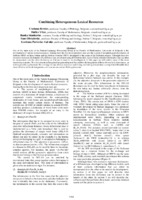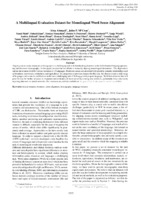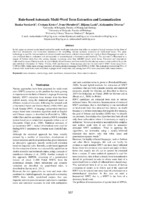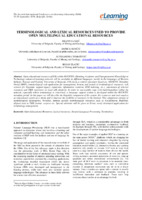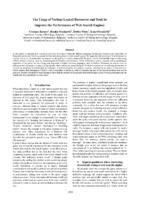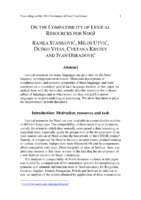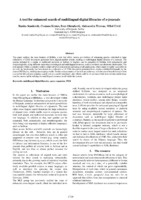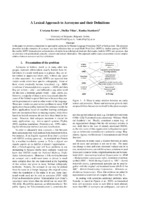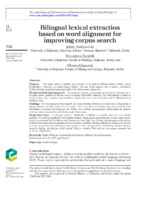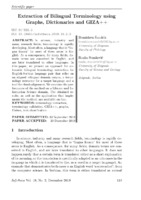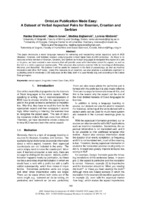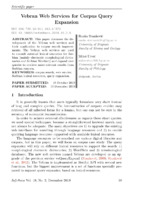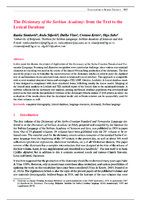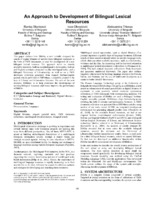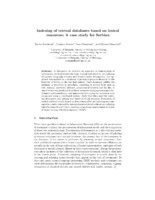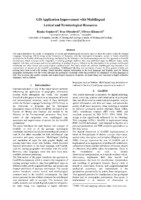Претрага
102 items
-
E-Dictionaries and Finite-State Automata for the Recognition of Named Entities
Krstev Cvetana, Vitas Duško, Obradović Ivan, Utvić Miloš. "E-Dictionaries and Finite-State Automata for the Recognition of Named Entities" in Proceedings of the 9th International Workshop on Finite State Methods and Natural Language Processing, FSMNLP 2011, July 2010, Blois, France, A. Maletti and M. Constant (eds.), :Association for Computational Linguistics (2011): 48-56
-
Combining Heterogeneous Lexical Resources
... used for the production of electronic resources, and almost none exist in electronic form, the Serbian resources presented in this paper have been manually produced, checked and double checked. Our standpoint is that only when reliable lexical resources in electronic form are fully developed it ...
... the two most important ones are: the system of morphological dictionaries of Serbian (SMD) in Intex format and the Serbian wordnet (SWN) developed in the scope of the Balkanet project. Although these two resources represent dictionaries of a different type, developed using different models, each of ...
... important ones are: • The system of morphological dictionaries of Serbian (SMD) in Intex format (Silberztein, 2000), that consists of a dictionary of simple lemmas, a dictionary of compounds (under construction), the corresponding dictionaries of word forms, and morphological finite-state automata ...Cvetana Krstev, Duško Vitas, Ranka Stanković, Ivan Obradović, Gordana Pavlović-Lažetić. "Combining Heterogeneous Lexical Resources" in Proceedings of the Fourth Interantional Conference on Language Resources and Evaluation, Lisabon, Portugal , May 2004, vol. 4, ELRA - European Language Resources Association (2004)
-
A Multilingual Evaluation Dataset for Monolingual Word Sense Alignment
Sina Ahmadi, John P McCrae, Sanni Nimb, Fahad Khan, Monica Monachini, Bolette S Pedersen, Thierry Declerck, Tanja Wissik, Andrea Bellandi, Irene Pisani, [...] Ranka Stanković and others (2020)Aligning senses across resources and languages is a challenging task with beneficial applications in the field of natural language processing and electronic lexicography. In this paper, we describe our efforts in manually aligning monolingual dictionaries. The alignment is carried out at sense-level for various resources in 15 languages. Moreover, senses are annotated with possible semantic relationships such as broadness, narrowness, relatedness, and equivalence. In comparison to previous datasets for this task, this dataset covers a wide range of languages ...... challenging task with beneficial applications in the field of natural language process- ing and electronic lexicography. In this paper, we describe our efforts in manually aligning monolingual dictionaries. The alignment is carried out at sense-level for various resources in 15 languages. Moreover, senses ...
... examples of LSRs are dictionaries. Dictionaries form an important foundation of numerous natural language processing (NLP) tasks, including word sense disambiguation, machine trans- lation, question answering and automatic summarization. However, the task of combining dictionaries from different sources ...
... have the same part- of-speech tags. Spelling variations are normalized to a unique variation. 3.3. Dictionaries used in the creation of the dataset For alignment we used the following dictionaries: Basque The Basque Wordnet (MCR 3.0) and the Basque Monolingual Dictionary ”Euskal Hiztegia” (copyright ...Sina Ahmadi, John P McCrae, Sanni Nimb, Fahad Khan, Monica Monachini, Bolette S Pedersen, Thierry Declerck, Tanja Wissik, Andrea Bellandi, Irene Pisani, [...] Ranka Stanković and others . "A Multilingual Evaluation Dataset for Monolingual Word Sense Alignment" in Proceedings of the 12th Conference on Language Resources and Evaluation (LREC 2020), Marseille, European Language Resources Association (ELRA) (2020)
-
Rule-based Automatic Multi-word Term Extraction and Lemmatization
In this paper we present a rule-based method for multi-word term extraction that relies on extensive lexical resources in the form of electronic dictionaries and finite-state transducers for modelling various syntactic structures of multi-word terms. The same technology is used for lemmatization of extracted multi-word terms, which is unavoidable for highly inflected languages in order to pass extracted data to evaluators and subsequently to terminological e-dictionaries and databases. The approach is illustrated on a corpus of Serbian texts from ...... In this paper we present a rule-based method for multi-word term extraction that relies on extensive lexical resources in the form of electronic dictionaries and finite-state transducers for modelling various syntactic structures of multi-word terms. The same technology is used for lemmatization ...
... to accomplish their task successfully. Secondly, lemmas are necessary for incorporating the MWTs in morphological dictionaries in compliance with the form these dictionaries require. This is essential as the set of forms found in the corpus is rarely comprehensive, and thus all potential forms ...
... terminology extraction for Serbian based on e-dictionaries and local grammars. For extraction purposes 14 graphs were developed, which extract the most frequent syntactic structures identified by an analysis of several Serbian terminological dictionaries and Serbian e-dictionary of MWUs. The approach ...Ranka Stanković, Cvetana Krstev, Ivan Obradović, Biljana Lazić, Aleksandra Trtovac. "Rule-based Automatic Multi-word Term Extraction and Lemmatization" in Proceedings of the 10th International Conference on Language Resources and Evaluation, LREC 2016, Portorož, Slovenia, 23--28 May 2016, European Language Resources Association (2016)
-
Terminological and lexical resources used to provide open multilingual educational resources
Open educational resources (OER) within BAEKTEL (Blending Academic and Entrepreneurial Knowledge in Technology enhanced learning) network will be available in different languages, mostly in the languages of Western Balkans, Russian and English. University of Belgrade (UB) hosts a central repository based on: BAEKTEL Metadata Portal (BMP), terminological web application for management, browse and search of terminological resources, web services for linguistic support (query expansion, information retrieval, OER indexing, etc.), annotation of selected resources and OER repository on local edX ...... with personal computers, to the Internet expansion. The last one ensured the infrastructure for online terminological resources, such as electronic dictionaries and term bases, which can be monolingual, 2 Available at: http://www.macmillandictionary.com/dictionary/british/terminol ogy bilingual ...
... Conference on e-Learning (eLearning-2012), 2012, pp. 114–119. [9] S. Vujičić Stanković, C. Krstev and D. Vitas, “Enriching Serbian WordNet and Electronic Dictionaries with Terms from the Culinary Domain,” in Proc. 7th Global WordNet Conference, 2014, pp. 127–132. [10] M. Hepp, “Ontologies: State of the ...
... morphological dictionary. Serbian morphological dictionaries include semantic markers which allow the distinction between ijekavian, ekavian and ikavian pronunciation. Dictionaries cover both general lexica and proper names. Serbian morphological dictionaries are found in LADL (Laboratoire d'Automatique ...Biljana Lazić, Danica Seničić, Aleksandra Tomašević, Bojan Zlatić. "Terminological and lexical resources used to provide open multilingual educational resources" in The Seventh International Conference on eLearning (eLearning-2016), 29-30 September 2016, Belgrade, Serbia, Belgrade : Belgrade Metropolitan University (2016)
-
The Usage of Various Lexical Resources and Tools to Improve the Performance of Web Search Engines
In this paper we present how resources and tools developed within the Human Language Technology Group at the University of Belgrade can be used for tuning queries before submitting them to a web search engine. We argue that the selection of words chosen for a query, which are of paramount importance for the quality of results obtained by the query, can be substantially improved by using various lexical resources, such as morphological dictionaries and wordnets. These dictionaries enable semantic ...LR web services, MultiWord Expressions & Collocations, Information Extraction, Information Retrieval... developed for Serbian (Krstev et al., 2008). These resources include morphological e-dictionaries and finite state transducers, which offer the possibilities for solving the problem of flections in queries, and electronic thesauri, ontologies and wordnets which offer various possibilities for automatic ...
... quality of results obtained by the query, can be substantially improved by using various lexical resources, such as morphological dictionaries and wordnets. These dictionaries enable semantic and morphological expansion of the query, the latter being very important in highly inflective languages, such ...
... which structure should be attributed to a free phrase when several options exist according to e-dictionaries. A nice example is the phrase Republika Francuska which, according to the dictionaries can be analyzed as a phrase of the form noun+noun or noun+adjective. Since the latter structure ...Krstev Cvetana, Stanković Ranka, Vitas Duško, Obradović Ivan. "The Usage of Various Lexical Resources and Tools to Improve the Performance of Web Search Engines" in LREC 2008: Conference on Language Resources and Evaluation, Marrakesh, Morocco, May 2008, European Language Resources Association (ELRA) (2008)
-
On the compatibility of lexical resources for NooJ
Lexical resources for many languages are provided for the NooJ linguistic development environment. Meta-data descriptions of morphosyntactic and semantic properties of these languages and their resources are a mandatory part of each language module. In this paper we analyze how well the meta-data actually describe resources for a chosen subset of languages and to what extent are they compatible across languages to support multilingual processing. We show that there is place for improvement in both directions.... grammar extracts (approximately) the same concepts from aligned texts in different languages, using the information stored in the system of electronic dictionaries (Vitas et al. 2008), in the next step of the analysis, an attempt was made to construct NooJ expressions that could extract the same concepts ...
... “faithful” is the translation compared to the original, and the other – the manner in which specific information is marked in the system of electronic dictionaries. The first condition was satisfied to a great extent, but the second, as it has already been demonstrated, was not. Instead of universal ...
... category, while it appears in Bulgarian dictionaries: masculine gender - господар,N+M, feminine gender - глава,N+F and neutral gender - лице,N+NE. Conversely, which is though not unexpected, there were *.def categories which did not appear in text dictionaries. In addition to that, further review ...Ranka Stanković, Miloš Utvić, Duško Vitas, Cvetana Krstev, Ivan Obradović. "On the compatibility of lexical resources for NooJ" in Automatic Processing of Various Levels of Linguistic Phenomena: Selected Papers from the 2011 International Nooj Conference, Cambridge Scholars Publishing (2012): 96-108
-
A Tool for Enhanced Search of Multilingual Digital Libraries of E-journals
This paper outlines the main features of Bibliša, a tool that offers various possibilities of enhancing queries submitted to large collections of TMX documents generated from aligned parallel articles residing in multilingual digital libraries of e-journals. The queries initiated by a simple or multiword keyword, in Serbian or English, can be expanded by Bibliša, both semantically and morphologically, using different supporting monolingual and multilingual resources, such as wordnets and electronic dictionaries. The tool operates within a complex system composed ...... by Bibliša, both semantically and morphologically, using different supporting monolingual and multilingual resources, such as wordnets and electronic dictionaries. The tool operates within a complex system composed of several modules including a web application, which makes it readily accessible on ...
... englesko-srpski, srpsko-engleski, Beograd: Narodna biblioteka Srbije. Krstev, C. (2008). Processing of Serbian – Automata, Texts and Electronic dictionaries. Belgrade: Faculty of Philology, University of Belgrade. Obradović, I., Stanković, R., Utvić, M. (2008). An Integrated Environment for ...
... system has at its disposal several other lexical resources, such as morphological e-dictionaries. Together with the system of rules for compound inflection, finite automata and transducers, these dictionaries represent the basis for morphological expansion of queries. As for semantic and bilingual ...Ranka Stanković, Cvetana Krstev, Ivan Obradović, Aleksandra Trtovac, Miloš Utvić. "A Tool for Enhanced Search of Multilingual Digital Libraries of E-journals" in Proceedings of the 8th International Conference on Language Resources and Evaluation, LREC 2012, May 2012, Istanbul, Turkey, Istanbul, Turkey : European Language Resources Association (2012)
-
A Lexical Approach to Acronyms and their Definitions
In this paper we present a comprehensive approach to acronyms for Natural-Language Processing (NLP) of Serbian texts. The proposed procedure includes extraction of acronyms and their definitions that are usual Multi-Word Units (MWUs), shallow parsing of MWUs that enables MWU lemmatization and production of entries in morphological electronic dictionaries, both for MWU and acronyms, that are provided with grammatical, syntactic, semantic and domain information. This approach enables representation that reflects complex relations between acronyms and their definitions.... that are usual Multi-Word Units (MWUs), shallow parsing of MWUs that enables MWU lemmatization and production of entries in morphological electronic dictionaries, both for MWU and acronyms, that are provided with grammatical, syntactic, semantic and domain information. This approach enables representation ...
... Also, “words” are just potential words of a lan- guage – strings of alphabetic characters – and we do not look for them in dictionaries. However, we have to look in dictionaries to confirm, for instance, the occurrence of prepositions and/or conjunctions. These patterns are im- plemented as Unitex4 ...
... the input is different and the used e-dictionaries as well. For the same example as before and the form (sim- ple word lemma) mirovan the following e-dictionary lines are used: (10) mirovan,mirovne.A:aefs2g mirovan,mirovne.A:aefp1g This form of e-dictionaries is obtained from the previous form by ...Cvetana Krstev, Duško Vitas, Ranka Stanković. "A Lexical Approach to Acronyms and their Definitions" in Proceedings of the 7th Language & Technology Conference, November 27-29, 2015, Poznań, Poland, Springer (2015)
-
Keyword-Based Search on Bilingual Digital Libraries
This paper outlines the main features of Biblisha, a tool that offers various possibilities of enhancing queries submitted to large collections of aligned parallel text residing in bilingual digital library. Biblishsa supports keyword queries as an intuitive way of specifying information needs. The keyword queries initiated, in Serbian or English, can be expanded, both semantically, morphologically and in other language, using different supporting monolingual and bilingual resources. Terminological and lexical resources are of various types, such as wordnets, electronic ...Ranka Stanković, Cvetana Krstev, Duško Vitas, Nikola Vulović, Olivera Kitanović. "Keyword-Based Search on Bilingual Digital Libraries" in Semantic Keyword-Based Search on Structured Data Sources - Second COST Action IC1302 International KEYSTONE Conference, IKC 2016, Springer (2017). https://doi.org/10.1007/978-3-319-53640-8_10
-
Bilingual lexical extraction based on word alignment for improving corpus search
Jelena Andonovski, Branislava Šandrih, Olivera Kitanović. "Bilingual lexical extraction based on word alignment for improving corpus search" in The Electronic Library, Emerald (2019). https://doi.org/10.1108/EL-03-2019-0056
-
Extraction of Bilingual Terminology Using Graphs, Dictionaries and GIZA++
Branislava Šandrih, Ranka Stanković (2020)U nauci, industriji i mnogim istraživačkim oblastima, terminologija se brzo razvija. Najčešće, jezik koji je „lingua franca“ za većinu ovih oblasti je engleski. Kao posledica toga, za mnoga polja termini domena su koncipirani na engleskom, a kasnije se prevode na druge jezike. U ovom radu predstavljamo pristup za automatsko izdvajanje dvojezične terminologije za englesko-srpski jezički par koji se oslanja na usaglašeni dvojezični korpus domena, ekstraktor terminologije za ciljni jezik i alat za usklađivanje delova. Ispitujemo performanse metode na domenu ...... adou. “A Hybrid Approach to Compiling Bilingual Dictionaries of Medical Terms from Parallel Corpora”. Statistical Language and Speech Processing Vol. 8791 (2014): 57–69 Krstev, Cvetana. Processing of Serbian. Automata, Texts and Electronic Dictionaries. Faculty of Philology of the University of Belgrade ...
... Extraction of Bilingual Terminology Using Graphs, Dictionaries and GIZA++ Branislava Šandrih, Ranka Stanković Дигитални репозиторијум Рударско-геолошког факултета Универзитета у Београду [ДР РГФ] Extraction of Bilingual Terminology Using Graphs, Dictionaries and GIZA++ | Branislava Šandrih, Ranka Stanković ...
... employees' publications. - The Repository is available at: www.dr.rgf.bg.ac.rs Scientific paper Extraction of Bilingual Terminology using Graphs, Dictionaries and GIZA++ UDC 81’322.2 DOI 10.18485/infotheca.2019.19.2.6 ABSTRACT: In science, industry and many research fields, terminology is rapidly developing ...Branislava Šandrih, Ranka Stanković. "Extraction of Bilingual Terminology Using Graphs, Dictionaries and GIZA++" in Infotheca, Faculty of Philology, University of Belgrade (2020). https://doi.org/10.18485/infotheca.2019.19.2.6
-
OntoLex Publication Made Easy: A Dataset of Verbal Aspectual Pairs for Bosnian, Croatian and Serbian
Ovaj rad predstavlja novi jezički resurs za pretraživanje i istraživanje verbalnih aspektnih parova u BCS (bosanskom, hrvatskom i srpskom), kreiran korišćenjem principa Lingvističkih Povezanih Otvorenih Podataka (LLOD). Pošto ne postoji resurs koji bi pomogao učenicima bosanskog, hrvatskog i srpskog kao stranih jezika da prepoznaju aspekt glagola ili njegove parove, kreirali smo novi resurs koji će korisnicima pružiti informacije o aspektu, kao i link ka aspektnim parovima glagola. Ovaj resurs takođe sadrži spoljne linkove ka monolingvalnim rečnicima, Wordnetu i BabelNetu. ...Ranka Stanković, Maxim Ionov, Medina Bajtarević, Lorena Ninčević. "OntoLex Publication Made Easy: A Dataset of Verbal Aspectual Pairs for Bosnian, Croatian and Serbian" in Proceedings of the 9th Workshop on Linked Data in Linguistics @ LREC-COLING 2024, Turin, 20-25 May 2024, ELRA and ICCL (2024)
-
FrameNet Lexical Database: Presenting a Few Frames Within the Risk Domain
U radu se daje kratak prikaz teorije semantike okvira, na kojoj je zasnovana leksička baza Frejmnet. Predstavljena je koncepcija ove mreže, kao i mogućnosti njene primene. Predstavljena je i leksička analiza koja se primenjuje u projektu izrade Frejmneta i ukazano na razlike između analize zasnovane na okviru u odnosu na analizu zasnovanu na reči. Zatim je prikazano nekoliko povezanih okvira koje prizivaju reči iz domena rizika. U radu je predstavljena i platforma NLTК pomoću koje se mogu koristiti ...... Approach for Raw Material Terminology.” Applied Sciences 11 (7): 2892. Krstev, Cvetana. 2008. Processing of Serbian. Automata, texts and electronic dictionaries. Faculty of Philology of the University of Belgrade. Krstev, Cvetana, and Duško Vitas. 2005. “Corpus and Lexicon-Mutual Incompletness.” In ...
... Infotheca Vol. 21, No. 1, September 2021 Scientific paper Stanković, Ranka, Cvetana Krstev, Biljana Lazić, and Mihailo Škorić. 2018. “Electronic dictionaries-from file system to lemon based lexical database.” In Proceedings of the 11th LREC - W23 6th Workshop on Linked Data in Linguistics: Towards ...
... the noun risk in mono- lingual dictionaries and corpus data, they concluded that the dictionaries do not give a comprehensive enough description, with a lot of the meanings found through corpus search not even being mentioned. The finding was that printed dictionaries, with a linear approach to meaning ...Aleksandra Marković, Ranka Stanković, Natalija Tomić, Olivera Kitanović. "FrameNet Lexical Database: Presenting a Few Frames Within the Risk Domain" in Infotheca, Faculty of Philology, University of Belgrade (2021). https://doi.org/10.18485/infotheca.2021.21.1.1
-
Vebran Web Services for Corpus Query Expansion
Ranka Stanković, Miloš Utvić (2020)U ovom radu se govori o razvoju veb usluga Vebran i njihovoj primeni u poboljšanju pretraživanja korpusa. Veb-servisi Vebran koriste se za konsultovanje spoljnih leksičkih izvora za srpski jezik (uglavnom elektronski morfološki rečnici i srpski Vordnet) i proširivanje korisničkih upita radi dobijanja relevantnijih rezultata iz srpskih korpusa.... we will focus on corpus case study. The query expansion will rely on different lexical resources to support the search: 1) morphological electronic dictionaries; 2) WordNets and 3) terminological databases. The new web services named Vebran are developed as an up- grade of the previous service wsQueryExpand ...
... annotation of both corpora. The Tree- Tagger language parameter file for Serbian was created as a derivative of a system of Serbian Morphological electronic Dictionaries (SMD, cf. 3.1), au- thored by Cvetana Krstev and Duško Vitas (Krstev, 2008). 1 http://www.korpus.matf.bg.ac.rs 2 http://www.korpus.matf.bg ...
... resources have been developed for Serbian by the HLT Group at the University of Belgrade and JeRTeh Society: – System of Serbian morphological electronic dictionaries (Unitex DELA format); 7 https://unitexgramlab.org/ 102 Infotheca Vol. 19, No. 2, December 2019 Scientific paper – Semantic network WordNet ...Ranka Stanković, Miloš Utvić. "Vebran Web Services for Corpus Query Expansion" in Infotheca, Faculty of Philology, University of Belgrade (2020). https://doi.org/10.18485/infotheca.2019.19.2.5
-
The Dictionary of the Serbian Academy: from the Text to the Lexical Database
In this paper we discuss the project of digitization of the Dictionary of the Serbo-Croatian Standard and Vernacular Language. Scanning and character recognition were a particular challenge, since various non-standard character set encoding was used in the course of the almost 60-year long production of the dictionary. The first aim of the project was to formalize the micro-structure of the dictionary articles in order to parse the digitized text of and transform it into structured data stored in relational lexical database. This approach ...... ian literary and vernacular language SASA and the Institute for Serbo-Croatian] Stanković, R., Krstev, C., Lazić, B., Škorić, M. (2018) Electronic Dictionaries – from File System to lemon Based Lexical Database, In 6th Workshop on Linked Data in Linguistic (LDL-2018), Towards Linguistic Data Science ...
... research purposes and for the production of various derived lexicographic products. 2 Related Work Digital dictionaries ceased to be a novelty a long time ago. The majority of new dictionaries are pro- duced (and in some cases exist only) in digital form. However, many significant lexicographic works ...
... 2 For instance, Ahačić (2015) presents a Slovenian Dictionary Portal that collects information from 22 dictionaries, dating from the 16th century to the present day. Some of these dictionaries were transformed into XML format, while other were developed in it. 2 / 9 ...Ranka Stanković, Rada Stijović, Duško Vitas, Cvetana Krstev, Olga Sabo. "The Dictionary of the Serbian Academy: from the Text to the Lexical Database" in Proceedings of the XVIII EURALEX International Congress: Lexicography in Global Contexts, Ljubljana : Ljubljana University Press, Faculty of Arts (2018)
-
An Approach to Development of Bilingual Lexical Resources
... englesko-srpski, srpsko-engleski, Beograd: Narodna biblioteka Srbije. [3] Krstev, C. 2008. Processing of Serbian – Automata, Texts and Electronic Dictionaries. Belgrade: Faculty of Philology, University of Belgrade. [4] Obradović, I., Stanković, R., Utvić, M. 2008. An Integrated Environment ...
... concept in both available lexical resources. Terms electronic learning and e-learning and their Serbian translational equivalents elektronsko učenje and e-učenje do not exist in either of the resources. Hence the English synset {electronic learning, e-learning} and its Serbian counterpart ...
... documents, is used for development of a new bilingual lexical resource. The approach relies on already available resources, Serbian morphological e-dictionaries, Serbian and English wordnets connected via the interlingual index, and a bilingual Dictionary of Librarianship, as well as on a TMX document ...Stanković Ranka, Obradović Ivan, Trtovac Aleksandra. "An Approach to Development of Bilingual Lexical Resources" in Proceedings of the Fifth Balkan Conference in Informatics BCI 2012, Workshop on Computational Linguistics and Natural Language Processing of Balkan Languages – CLoBL 2012, September 2012, Novi Sad : BCI (2012)
-
Managing mining project documentation using human language technology
Purpose: This paper aims to develop a system, which would enable efficient management and exploitation of documentation in electronic form, related to mining projects, with information retrieval and information extraction (IE) features, using various language resources and natural language processing. Design/methodology/approach: The system is designed to integrate textual, lexical, semantic and terminological resources, enabling advanced document search and extraction of information. These resources are integrated with a set of Web services and applications, for different user profiles and use-cases. Findings: The ...Digital libraries, Information retrieval, Data mining, Human language technologies, Project documentationAleksandra Tomašević, Ranka Stanković, Miloš Utvić, Ivan Obradović, Božo Kolonja . "Managing mining project documentation using human language technology" in The Electronic Library (2018). https://doi.org/10.1108/EL-11-2017-0239
-
Indexing of textual databases based on lexical resources: A case study for Serbian
In this paper we describe an approach to improvement of information retrieval results for large textual databases by pre-indexing documents using bag-of-words and Named Entity Recognition. The approach was applied on a database of geological projects financed by the Republic of Serbia in the last half century. Each document within this database is described by metadata, consisting of several fields such as title, domain, keywords, abstract, geographical location and the like. A bag of words was produced from these ...... collection, and additionally it does not take into account MWUs. The approach described in this paper bases lemmatization on morphological electronic dictionaries and finite state transducers for Serbian [6]. 4.1 Used Resources Lexical Resources. The resources for natural language processing of Serbian ...
... Petrović, Mr. Petar Petrović, asistent, Petrović. The biggest problem of the new system are specific technical terms that are not found in electronic dictionaries as well as quite a number of typographical errors in the document collection. However, this shortcoming can be rectified by correcting errors ...
... Paris (1990) 2. Gross, M.: The use of finite automata in the lexical representation of natural lan- guage. In: Gross, M., Perrin, D. (eds.) Electronic Dictionaries and Automata in Computational Linguistics, Lecture Notes in Computer Science, vol. 377, pp. 34–50. Springer Berlin / Heidelberg (1989), http://dx ...Ranka Stanković, Cvetana Krstev, Ivan Obradović, Olivera Kitanović. "Indexing of textual databases based on lexical resources: A case study for Serbian" in Semantic Keyword-based Search on Structured Data Sources : First COST Action IC1302 International KEYSTONE Conference, IKC 2015, Coimbra, Portugal, September 8-9, 2015. Revised Selected Papers, Springer (2015). https://doi.org/10.1007/978-3-319-27932-9_15
-
GIS Application Improvement with Multilingual Lexical and Terminological Resources
... considerable volume to date (Vitas et al., 2003). They include morphological e-dictionaries and finite state transducers, which offer the possibilities for solving the problem of flections in queries, and electronic thesauri, ontologies and wordnets which offer various possibilities for automatic ...
... tasks on the web. This tool was integrated with GeolISS to enable the use of lexical resources within this GIS application. Morphological dictionaries of simple words and compounds are in the so called LADL format (Courtois et al., 1990), and basically consist of lemmas accompanied by in ...
... creation of lemmas for a given list of compounds (Stanković, 2008b). This procedure is based on rules and relies on data from morphological dictionaries of simple words. Automatic creation of lemmas for compounds is of special importance for technical applications, as is the case here. Namely ...Ranka Stanković, Ivan Obradović, Olivera Kitanović. "GIS Application Improvement with Multilingual Lexical and Terminological Resources" in Proceedings of the 5th International Conference on Language Resources and Evaluation, LREC 2010, Valetta, Malta, May 2010, Valetta, Malta : European Language Resources Association (2010)

